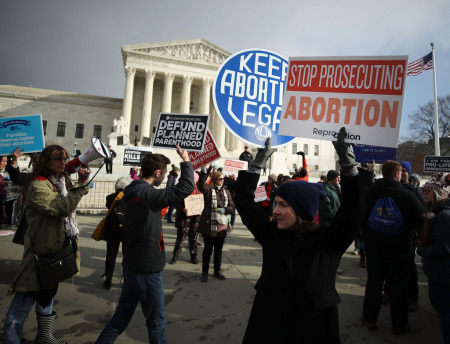Supreme Court reinstates FDA rule blocking delivery of abortion pills by mail

The U.S. Supreme Court on Tuesday reinstated a rule at the Food and Drug Administration requiring women to see doctors before they can receive medication for chemical abortions, overturning a lower court decision that enabled them to obtain the abortion pill via mail.
On Tuesday, the Supreme Court voted 6 to 3 to grant the FDA’s application for a stay against a lower court order requiring the government agency to suspend requirements for dispensing the abortion pill, also known as mifepristone.
Since its implementation in 2000, mifepristone, sold as Mifeprex in the United States, has been subjected to a “risk-evaluation mitigation strategy,” or REMS. REMS restrictions require the abortion-inducing drug to be administered by a qualified medical professional at a healthcare setting, such as a clinic or hospital.
But during the coronavirus pandemic, groups in favor of increasing abortion access like the American College of Obstetricians and Gynecologists have argued that the rule constituted a “substantial” obstacle for women looking to have an abortion.
In July, U.S. District Judge Theodore Chuang in Maryland, who was appointed by Democrat President Barack Obama, agreed with their analysis and suspended the FDA rule.
In a concurring opinion, Chief Justice John Roberts rejected the premise that the issue at hand was “whether the requirements for dispensing mifepristone impose an undue burden as a general matter.”
Roberts maintained that “the question is instead whether the District Court properly ordered the Food and Drug Administration to lift those established requirements because of the Court’s own evaluation of the COVID-19 pandemic.”
“Courts owe significant deference to the politically accountable entities with the ‘background, competence, and expertise to assess public health,’” Roberts contended. The chief justice added that he “did not see a sufficient basis here for the District Court to compel the FDA to alter the regimen for medical abortion.”
Tuesday’s decision comes months after the Supreme Court temporarily upheld Chuang’s ruling while asking the judge to “promptly consider” amending or withdrawing his decision. When Chuang declined to amend his decision last month, the FDA again appealed to the Supreme Court.
As a result of the Court’s ruling, the requirement that women see a doctor before obtaining abortion pills will be reinstated as the case continues to make its way through the legal system. However, the incoming Joe Biden administration, which is expected to ally itself with the pro-abortion movement, could opt to suspend the ban on receiving abortion pills by mail.
Planned Parenthood, the nation’s largest abortion provider and one of the most outspoken abortion advocacy groups in the U.S., took to Twitter to voice its disapproval with the decision.
“Forcing patients to travel unnecessarily to a health center and risk COVID-19 exposure in order to access safe medication abortion is dangerous and serves only to create more barriers to care, especially for people of color and people with low incomes.”
Forcing patients to travel unnecessarily to a health center and risk COVID-19 exposure in order to access safe medication abortion is dangerous and serves only to create more barriers to care, especially for people of color and people with low incomes. https://t.co/U7gRREpeWO
— Planned Parenthood (@PPFA) January 13, 2021
Lila Rose, the founder of the pro-life activist organization Live Action, described the ruling as a “small but positive step.”
BREAKING: SCOTUS has granted Trump admin request, reverses nationwide injunction that allowed abortionists to ship abortion drugs via mail during the pandemic for at-home abortions. A small but positive step. NO abortion should be permitted by law, whether at home or in clinic.
— Lila Rose (@LilaGraceRose) January 12, 2021
The prominent pro-life lobbying group Susan B. Anthony List celebrated the decision. The group accused the pro-abortion lobby of seeking to “further jeopardize the health and safety of women.”
“Planned Parenthood and the abortion lobby even sought to exploit the #COVID 19 pandemic to push abortion by mail, promoting DIY abortion at home, upping the risk of serious complications,” the organization tweeted.
Last year, Live Action released an investigative report called “Abortion Pill Exposed,” which is part of a larger effort called “Abortion Pill Kills.” The movement seeks to “expose the history of the pill and the abortion industry’s plans to expand the drug.” The report highlights some of the complications that sometimes result from taking the pill, which include “severe cramping, contractions, and heavy bleeding.” According to the report, the abortion pill has caused 24 maternal deaths, more than 1,000 hospitalizations and more than 4,000 “adverse events.”
Additionally, the report highlights how the Obama administration’s FDA “extended the period women could take the abortion pill from the first 7 weeks of pregnancy to the first 10 weeks, reduced the required dosage of mifepristone from 600 milligrams to 200 milligrams, and reduced the number of required visits from three to two.”
Conservative senators who share the concerns of Live Action wrote a letter to FDA Commissioner Stephen Hahn, asking him to classify the abortion-inducing drugs as an “‘imminent hazard to the public health’ that poses a ‘significant threat of danger.’” They also urged the agency to pull it from the market.
On the other hand, abortion advocacy groups insist that women have nothing to worry about when taking the pill. During a recent appearance on a podcast, Ilyse Hogue, the president of NARAL Pro-Choice America, referred to medication abortions as “very safe.”
She expressed hope that the Biden administration would use the FDA to pursue the “advancement” of the abortion pill.






















